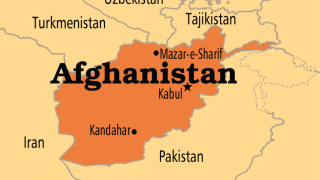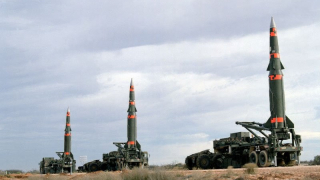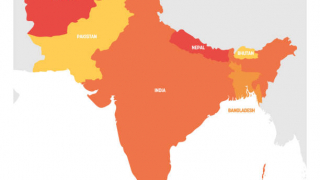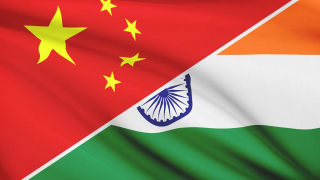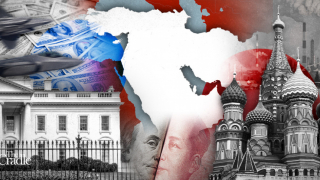Bangladesh should propose BCIM security pact for regional stability
Introduction
Bangladesh’s honorable Prime Minister Sheikh Hasina will be visiting India from April 7-10, 2017. Both countries have been showing great enthusiasm for the coming visit and many believe that the visit will be a game changer in South Asian regional politics which can pave the ways for new era of cooperation between two oldest but neighboring civilizations for bilateral economic development.
Here, in this policy piece, the author, by analyzing the background and present trend in regional geopolitics, will give a direction through which Bangladesh can play her role dealing a super-neighbor by keeping and enhancing her sovereignty and national interest.
Economic matrix
Economically, India and Bangladesh trade relation is not good at all. In recent years, India exports $6.1 billion and imports $462 million goods from Bangladesh. That's a huge but negative trade deficit for Bangladesh’s national interest. On the other hand, the US imports nearly 6 billion dollars goods yearly from Bangladesh and she exports nearly $ 900 million. Bangladesh also has a huge trade deficit with China as well, although China has been supporting infrastructural developments in Bangladesh to curb down the negative trade deficit. India’s other neighbors like Sri Lanka and Bhutan curbed down their negative trade deficits both with India and China. Also, Nepal has shown a great result dealing with China, but dealing with India is still dissatisfactory.
Development politics
Although many analysts believe that India is still 30 years behind from China in all development sectors, but Bangladesh must address this economic issue with delicate diplomacy both with our super neighbor India and our close neighbor China. Bangladesh must realize that China and India both are irreplaceable to each other and the guarantors of Bangladesh’s national prosperity. Recently, China has committed $24 billion for infrastructural development in Bangladesh. On the other hand, India has promised something to the tune of $2 billion and a controversial coal-based power plant in the environmentally critical area of Sundarban - and UNESCO declared site for natural conservation.
Major Disputes
Bangladesh's land area is surrounded by the Indian border, where Indian border guards kill around hundred of Bangladeshis annually. As many other neighboring countries in the world, India and Bangladesh have critical disputes. Some of them are solved diplomatically and some of them are under tireless negotiations. For example, in September 2011, the two countries signed a major accord on border demarcation to end the 4-decade old disputes over boundaries. Another achievement of Bangladesh's diplomacy is the Bay of Bengal sea water settlement with India.
It is also true that the bilateral agreements do not ensure the positive implementations regarding Bangladesh-India relations. As an instance, Bangladesh government under Sheikh Hasina, when she was running her first term as the head of state, came to an agreement with India on Farakka Dam water sharing issue. Unfortunately, Bangladesh is not receiving a fair, rational and necessary share of the Ganges water. Bangladesh observes that during the dry season India releases very little amount of water and it gets flooded when India releases excess waters in monsoon season when we don't need water. Teesta is now a dried and dead river for Indian policy. And river water sharing is another big issue between India and Bangladesh. For decades, it has been exerting huge economic and environmental impact since the Bangladeshi population lives on agriculture by natural irrigation.
Bangladesh as center of South Asian gravity
We don't have any history of direct hostilities with the Chinese except her support to Pakistan against Bangladesh in 1971. But later, China recognized Bangladesh as an independent sovereign country. Since China is becoming a global player and has put forth the grand design of the One Belt One Road Initiative and Maritime Silk Route. And from the perspective of China, Bangladesh is a necessary strategic hub for her to connect South Asia with South East Asia.
It appears that such geostrategic importance of Bangladesh from the Chinese perspective makes India uncomfortable. Already China enjoys enormous economic, strategic and historic relation with Pakistan and the relation is being founded well with CPEC project which India has not endorsed yet. Therefore, China can put geopolitical pressure on India from Pakistan and from the would-be friend Bangladesh. One is from the West and the other one is from the East. Both are Muslim populated country. Since the US is gradually taking with India against China, the South Asian geopolitical game will soon take new shapes and forms. We are observing a period when Russia, an old friend of India is running a balanced policy instead of fully supporting her. Already, the Afghanistan-Pakistan region, Kashmir, Arunachal, the Dalai Lama, domestic and international terrorism and many issues are coming up as disputes between US-led India and China.
On the foreseeable frictions between the Dragon and the Elephant
Both China and India have increased their military spending. Though India's budget is still 50% behind of the Chinese military budget, she has her ally, the US- the strongest military power. If the escalation of terrorism continues in the region, a regional proxy war can engulf the stability of the region as we have been observing in the Middle East nowadays. But a proxy war could turn out to be a nuclear, all-out war in South Asia between India and Pakistan.
However, Bangladesh is not a war party, but she must take defensive measures to protect her ethnic Bengali population and their nation named Bangladesh. In order to confront the upcoming situation, Bangladesh must take measures from at least four directions.
Preparation for Bangladesh to confront geopolitical friction
Economically, Bangladesh must curb down its trade deficit by facilitating and attracting local production. Since the country has enormous manpower, she should buy the technology, not the products. In such a manner, 50% of the trade deficit should be curtailed to promote heavy and small industries. We also find more space in bilateral relations.
Militarily, Bangladesh must increase her defense spending. Recently, Bangladesh has bought two submarines for its navy from China. Those are serving the purpose of sea security training for Bangladesh Navy. As a sovereign nation and to defend the world's third largest ethnicity, Bangladesh should outsource hi-tech weaponry from countries like Russia, USA, Turkey, India, Germany, and Belgium to diversify her defense mechanisms. The country has a long history of ship making and breaking. She must make enough gunships and destroyers to support international navigation in the Bay of Bengal. Electronic warfare will be the next game changer of any war theater, as we have been observing it in the civil war in Ukraine and in the wars in Syria and Iraq. We must develop our indigenous but hi-end technology. Since the world is leaning more towards hybrid proxy wars, Bangladesh's military should enhance and upgrade unconventional war tactics.
Bangladesh must clearly understand the state ideologies of regional and global powers, but take a stance on behalf of Bangladeshis with distinctive pragmatism. Bangladesh knows very well that Indian regional policy towards her is very influential. India has a certain cultural-political-economic base from the very birth of Bangladesh since India politically and militarily backed the liberation war of Bangladesh. Both Bengali Muslims and Indians fought against Pakistani terrorism and violence over Bengali population in 1971. Therefore, as a historical partner in fighting state sponsored terrorism, Bangladesh should be very careful about Indian red lines. For example, Bangladesh should not give any space to any country to destabilize the Indian seven sisters. Bangladesh must deter such existential threats whenever it appears. We must guarantee the maritime security over the Bay of Bengal to India and global trade navigations as well.
Culturally, Bangladesh can filter the practices of western liberal philosophies such as western secularism, western feminism, and LGBT because it finally leads to individualism. As country of 180 million people, Bangladesh must be very careful regarding such individualist philosophical practices by the NGOs since we have been observing that the West has used those western philosophies to tear apart social harmony and install chaos and instability in the Middle East, where people are losing their sense of humanity as a collective entity.
Tiger as a pacifier of a foreseeable clash between the Dragon and Elephant
It is an undeniable fact that the South Asia has entered into its chaotic phase. And the chaotic symptom is being manifested in the regional diplomacy, economics, politics and ongoing weaponization. But if Bangladesh can address the brewing situation pragmatically, she can emerge as a pacifier into the South Asian region. Otherwise, she can find herself as the war field of global proxy forces fighting each other. As I said in my previous publication, Bangladesh should not be a pawn of power collisions. Rather, it should focus on trade and development under a secure atmosphere.
Bangladesh is very vocal regarding the regional trade and development projects. During the post Soviet 90’s, Professor Rehman Sobhan advocated that multi-modal transport connectivity and supported by other initiatives and infrastructure development could significantly reduce transaction costs, stimulate trade and investment and consequently accelerate growth and poverty alleviation in this region. So, a forum was born in 1999. It was named as the Bangladesh–China–India–Myanmar Forum for Regional Cooperation (BCIM) corridor. The multi-modal corridor will be the first expressway between India and China and will pass through Myanmar and Bangladesh. It was agreed in 2013 that the corridor will run from Kunming to Kolkata, linking Mandalay in Myanmar as well as Dhaka and Chittagong in Bangladesh. At the same time, both Bangladesh and Myanmar has been observing low level Islamic insurgency that can severely hamper the project in future if both governments failed to contain those anti-development insurgents. In this regard, Bangladesh government has shown impressive result in dealing home grown Islamic militancy. And we hope that the government of Myanmar will take necessary steps to eradicate insurgency for a common and prosperous future.
The people of Bangladesh must know that their country represents a 4000 years old Bengal civilization. She has her own story of struggle. The government, who runs her, must respect to that 4000 years of victory, suppression and spiritual development. We must have our own policy towards regional peace and security. Already India has proposed one for bilateral defense pact. We are still very unclear about the extent of such deal. But it is also true that regional defense pact is more important than a bilateral defense pact when you are dealing a global terror threat.
The BCIM security pact for regional stability
Since our future is interconnected with the regional development and Bangladesh is a home of mostly Bengali Muslims, the threat of global terrorism can easily and rapidly breed here to unstable the whole region. As I said before, historically, in 1971, only Bengali Muslims with a strategic help from India fought and won over the Pakistan inflicted Islamic terrorism in the land of Bengal. Even recently, we have seen that Bangladeshi security forces neutralized a number of terrorists very efficiently. Therefore, Bangladesh should take the lead again in fighting Islamic extremism with the direct help of China, India and Myanmar. Bangladesh may have a MOU (Memorandum Of Understanding) on a possible defense deal with India on eradicating terrorism. There is no foreseeable harm in a short term bilateral defense pact in dealing terrorism. We have not seen any big threat from the SOFA (Status of Force Agreement) signed between the US and Bangladesh.
Since the special situation should be addressed with special measures, Bangladesh should prioritize a defense pact between the BCIM countries to contain the global threat of terrorism. The BCIM security pact is more important for regional security and infrastructural development than any bilateral defense pact because it is very inclusive, and it will democratize the regional defense system with necessary transparency. Additionally, China envisions economic globalization; she also expressed interest to lead the new world order. Moreover, China and India wants to take more responsibilities and make more commitments towards a peaceful world than any other countries in the region. With direct financial, logistic and technical assistance from China, India and Myanmar, Bangladesh- as history proven leader to confront Islamic militancy, can create a safe and secured atmosphere in South Asia that can emerge as a model of terror-free zone of the world. In future, the Bangladesh-Bhutan-India-Nepal or BBIN road initiative, a $1 billion project funded by India, can also get security support form BCIM security pact. Bhutan and Nepal can join such regional security system too for better coordination in fighting terrorism.
Conclusion
If Bangladesh can take such steps pragmatically, she would be capable of creating a confident, self-determined, and enormous power-emanating entity in region in the coming future ranking among the top in the region within decades. The world shouldn’t forget that in 1971 a country was born after a horrific bloodbath, and she will keep the fight ongoing until her last blood to keep Bangladesh, the land of the 4000-years-old civilization, safe from evil conspirators.




